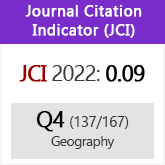The impact of the international economic crisis in the Spanish immigration policy
DOI:
https://doi.org/10.3989/estgeogr.0505Keywords:
immigration, immigration in Spain, immigration in Spain and economic crisis, economic recession and labor migrationAbstract
Preceded by a significant flow of immigrants in the last two decades of the twentieth century, the increase of the foreign residents in Spain since 2000 has been extraordinary. In 1999 the number of foreign residents in Spain was 750,000 (1.86% of the total population). Ten years later, foreigners living in Spain are more than 5.5 million (12% of the total population). But after 2007, flows of inmigrant workers have been modified as a result of the global economic downturn. The numbers of new immigrant workers in Spain have been dramatically reduced by the decline in demand in our labor market. The economic recession caused a shift in immigration policy in Spain, which to this point focused on amnesties of large influxes of immigrants in continuous progression. The new Spanish immigration policy is deterrent to those outside, clearly inclusive of those within, open to the repatriation of those who so desire, and, experimentally, fully decentralized.
Downloads
References
Aja, E., Arango, J. y Oliver, J. (Dir.), (2007): “Anuario de la inmigración en España 2006”. CIDOB, Barcelona.
Aja, E., Arango, J. y Oliver, J. (Dir.), (2009): “La inmigración en la encrucijada. Anuario de la inmigración en España 2008”. CIDOB, Barcelona.
Aja, E., Arango, J. y Oliver, J. (Dir.), (2010): “La inmigración en tiempos de crisis. Anuario de la inmigración en España 2009”. CIDOB, Barcelona.
Arango, J., (2005): “Dificultades y dilemas de la política de inmigración”. Arbor: Ciencia, pensamiento y cultura, nº 713, 2005, pp. 17-25, CSIC, Madrid.
Arango, J., (2006): “Europa y la inmigración: una relación difícil”. Migraciones: nuevas movilidades en un mundo en movimiento, coord. Por María Cristina Blanco Fernández de Valderrama, p. 91-114, Anthropos, Barcelona.
Banco de España, (2008): INFORME ANUAL 2008, Capítulo 2. El impacto de la crisis financiera sobre la economía española, pp. 47-70.
Barrett, A., McGuinness, S. and O’Brien. M., (2008): “The Immigrant Earnings Disadvantage across the Earnings and Skills Distributions: The Case of Immigrants from the EU’s New Member States in Ireland”. Institute for the Study of Labor, Bonn.
Camarota, S.A., (2003): “Immigration in a Time of Recession: An Examination of Trends Since 2000”. Backgrounder, Center for Immigration Studies, 10 p.
Castles, S., (2009): “Migration and the Global Financial Crisis: A Virtual Symposium. Update 1.A: An Overview”, http://www.age-of-migration.com/uk/financialcrisis/updates/1a.pdf
Cebrián, J. A., Bodega, M. I. y Martín Lou, M. A., (2008): “Back to Europe: Geografía de una inmigración sin precedentes”. Revista Geográfica, Instituto Panamericano de Geografía e Historia, nº 144, pp. 25-55.
Dobson, J., Latham, A. and Salt, J., (2009): “On the Move? Labour Migration in Times of Recession”. Policy Network Papers, London.
Favell, A., (2008): “The new face of East-West migration in Europe”. Journal of Ethnic and Migration Studies, 34 (5): 701-716. doi:10.1080/13691830802105947
Fix, M., Papademetriou, D. G., Batalova, J., Terrazas, A., Yi-Ying Liu, S. and Mittlestadt, M., (2009): “Migration and the Global Recession”. Migration Policy Institute, 131 p.
INE., (2009.): Encuesta de la Población Activa (EPA), 4º trimestre.
Izquierdo, A y León, S., (2008): “La inmigración hacia dentro: argumentos sobre la necesidad de coordinación de las políticas de inmigración en un Estado multinivel”. Política y sociedad, vol. 45, número 1, Universidad Complutense, Madrid.
Krings, T., Bobek, A., Moriarty, E., Salamo’nska, J. and Wickham, J., (2009): “New Times? Economic Crisis, geo-political transformation and the emergent migration order. Defying the recession? Polish migrants in Post-Celtic Tiger Ireland”. Centre on Migration, Policy and Society, University of Oxford, 15 p.
Martin, P., Abella, M. and Kuptsch, C., (2006): Managing Labour Migration in the Twenty-First Century. New Haven/London, Yale University Press.
Martin, P., (2009): “The Recession and Migration: Alternative Scenarios”. International Migration Institute Working Papers, Oxford.
OECD, (2009): International Migration Outlook 2009. Organisation for Economic Co-Operation and Development, Paris.
Oliver Alonso, J., (2006): “Inmigración y mercado del trabajo en 2006: Razones de la acentuación del choque inmigratorio”. Anuario la inmigración en España 2006. CIDOB, Barcelona.
Papademetriou, D. G., Sumption, M. and Somerville, W., (2009): “Migration and the Economic Downturn: What to expect in the European Union. Migration Policy Institute, 19 p.
Recchi, E. (2008): “Cross-state mobility in the EU: trends, puzzles and consequences”. European Societies, 10, (2): 197-224. doi:10.1080/14616690701835287
Rogers, A, Anderson, B. and Clarke, N., (2009): “Recession, Vulnerable Workers and Immigration: Background Report”. Centre on Migration, Policy and Society, Oxford.
Downloads
Published
How to Cite
Issue
Section
License
Copyright (c) 2010 Consejo Superior de Investigaciones Científicas (CSIC)

This work is licensed under a Creative Commons Attribution 4.0 International License.
© CSIC. Manuscripts published in both the printed and online versions of this Journal are the property of Consejo Superior de Investigaciones Científicas, and quoting this source is a requirement for any partial or full reproduction.All contents of this electronic edition, except where otherwise noted, are distributed under a “Creative Commons Attribution 4.0 International” (CC BY 4.0) License. You may read here the basic information and the legal text of the license. The indication of the CC BY 4.0 License must be expressly stated in this way when necessary.
Self-archiving in repositories, personal webpages or similar, of any version other than the published by the Editor, is not allowed.
















